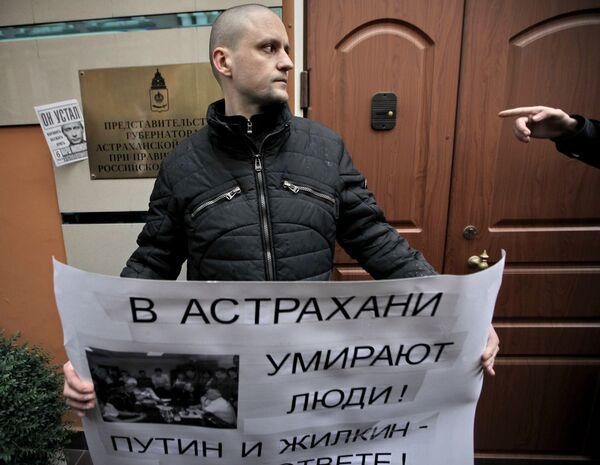Scores of demonstrators gathered in driving rain on Monday afternoon in downtown Moscow to protest disputed elections in a major south Russian city and lend their support to hunger strikers calling for a revote there.
“We will also go on hunger strike to show our support,” opposition Left Front leader Sergei Udaltsov said, standing outside the capital’s Astrakhan region representative office. “There will be rallies here every day until this very important issue is resolved.”
Over a dozen opposition supporters and former candidate Oleg Shein have been on hunger strike for over three weeks in protest over the March 4 victory of Mikhail Stolyarov, a member of President-elect Vladimir Putin’s United Russia, in mayoral elections in Astrakhan.
A Just Russia candidate Shein and supporters have alleged mass vote fraud at the polls in the Volga River city of some 500,000. Shein also earlier told journalists he was “ready” to die in his bid to force new elections.
But Shein dismissed as “nonsense” on Sunday blog reports that he and his supporters were on the brink of death. “We’re taking good care of our health,” he told RIA Novosti.
Russia’s powerful election committee earlier said it could only order a revote if a court ruled that any proven violations seriously distorted the outcome of the vote. A Just Russia leader Sergei Mironov told journalists on Monday that the election authorities had pledged to make available webcam recordings from all polling stations in the city.
Police in Moscow made repeated calls for the some 100 protesters to leave the courtyard on Monday, but made no move to break up the rally.
“I’m here to back the hunger strikers and show my solidarity,” said protester Irina Nezabudka, wearing a white ribbon that has become the symbol of Russia’s For Fair Elections movement. “Electoral fraud is a criminal matter.”
Monday’s rally comes a little over four months since tens of thousands of Russians poured out into the streets to vent their anger at widespread allegation of vote fraud in favor of United Russia at December’s parliamentary elections.
Protests continued up to and after Putin’s landslide victory in presidential polls, also on March 4 and likewise marred by allegation of electoral violations, but numbers have declined significantly since the peak of the demonstrations.
The opposition was handed a morale-boosting victory at April mayoral elections in Yaroslavl, a city near Moscow, when its joint candidate soundly defeated the United Russia incumbent. Hundreds of independent electoral observers flooded into Yaroslavl to monitor that vote.


